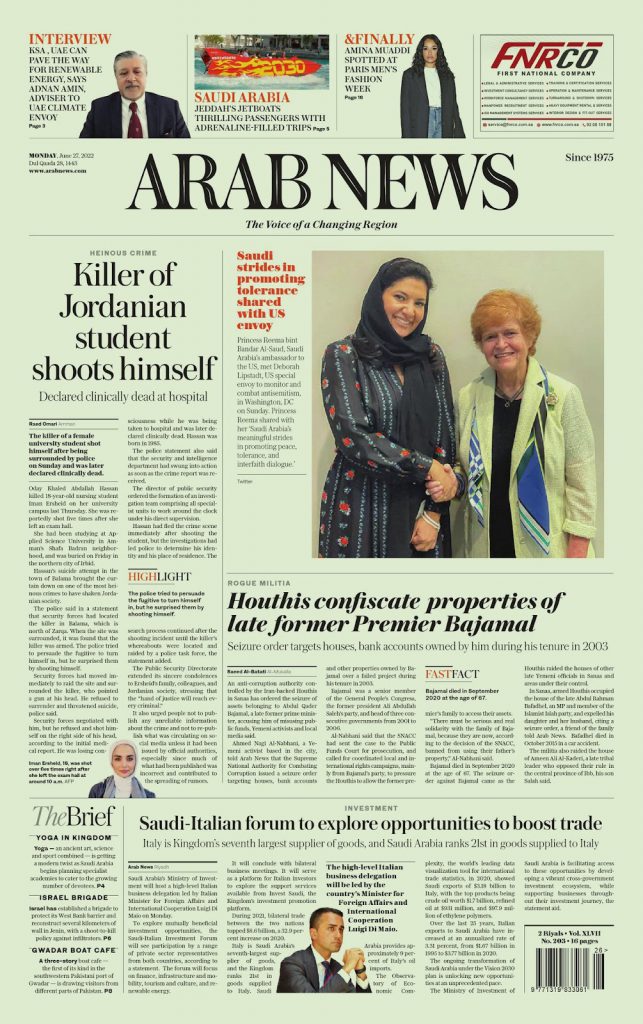A Threat to Women in the US or Middle East Is a Threat to Freedom Everywhere
US Jewish academic and Holocaust expert Deborah Lipstadt addressing the Senate Foreign Relations Committee. Photo: Reuters/Sipa USA/Rod Lamkey
Though some might have missed it, leading media outlet Arab News featured an extraordinary front page last Monday.
The lead story on page 1 was topped by a photo featuring Princess Reena Bint Bandar Al Saud, the Saudi ambassador to the US, shaking hands with Dr. Deborah Lipstadt, US Special Envoy to Combat Antisemitism. The two women were smiling and standing together, a powerful symbol of mutual respect and an indication of the progress of women in global diplomacy. It’s a moment that should be cherished by Americans and Saudis, and Muslims and Jews, particularly women.
Sadly in the same newspaper and on the same front page, another story appeared, one far more tragic. It was a report on the alleged perpetrator of a femicide crime who had shot himself to avoid police arrest and prosecution. The perpetrator had reportedly targeted and murdered Iman Ersheid, an 18-year-old nursing student in Jordan, because she reportedly refused his marriage proposal. Her death, an act of femicide, is far from an isolated incident in the Middle East and around the world.
Femicide refers to murders in which the perpetrator targets the victim based on her female gender identity; it is the lethal act of violence against women or girls, at times referenced as “honor killings,” where perpetrators take the lives of their female relatives because they do not approve of their perceived actions, decisions, and behaviors. Some examples that StopFemicideIran has tracked in Iran alone, include the girl who refused forced marriage, the woman who sought divorce, the girl or woman who didn’t act “modestly,” the child who watched the television at high volume, or the new bride who was told she had bad breath.
Such rationales seem unimaginable to Western observers, but in the majority of countries where such crimes are committed, the perpetrators are protected by legal double standards that regard women as inferior to their male counterparts. The lenience of these laws and the lack of deterrence contributes to the problem. But inequality before the law is not the only culprit in the disempowerment of women.
The disproportionate power dynamics between men and women, whether or not spelled out by the law, create environments where women are forced to balance their autonomy with social acceptance. In such environments which are not just geographically limited to the Middle East, women have to think about how they dress (so they are not judged as promiscuous), speak (so they don’t sound too bossy), work (so they don’t put their lives at risk), and even make marital and reproductive choices that satisfy social expectations.
Patriarchal societies long have compelled women around the world to negotiate their personal needs against social expectations. While it’s true that women have made progress in many spheres, history has shown us that such gains are fragile. We have seen time and again that the advances made by women can be reversed with a vote. The recent Roe V. Wade decision is one such setback.
And yet many fail to see the bigger picture. The loss of reproductive rights in the US doesn’t only affect American women; it also emboldens misogynistic leaders around the world to justify their sexist policies and behaviors — whether its compulsory hijab in Iran, female genital mutilation in Yemen or Iraq, public stoning of women in Afghanistan, or femicide in Jordan or elsewhere in the world. As Secretary of State Hillary Clinton said in 2017, women’s rights are human rights and such laws are unacceptable.
Feminism laid much of the groundwork for women’s progress in public life over the past six decades. Women of courage paved the way for Ambassador Lipstadt and Princess Bandar to work together and lead a global movement for tolerance. Yet, the pernicious threats to women’s lives and freedom around the world, particularly the women of Middle East, must be prioritized in the global feminist agenda. Today as women’s rights and safety are at risk, the feminist movement must write a new chapter of unity and global solidarity, and not desist.
Marjan Keypour Greenblatt is a human rights activist and founder of StopFemicideIran.org and ARAMIran.org. She’s a non-resident fellow at the Middle East Institute and member of ADL’s Task Force for Middle East Minorities.
|
What is an honour killing? |
|
An honour killing is a murder in the name of honour. If a brother murders his sister to restore family honour, it is an honour killing. According to activists, the most common reasons for honour killings are as the victim:
Human rights activists believe that 100,000 honour killings are carried out every year, most of which are not reported to the authorities and some are even deliberately covered up by the authorities themselves, for example because the perpetrators are good friends with local policemen, officials or politicians. Violence against girls and women remains a serious problem in Pakistan, India, Afghanistan, Iraq, Syria, Iran, Serbia and Turkey. |
Latest posts
-
ایران کے گلستان میں ناموس کے قتل: موبینہ کندابی کو اس کے شوہر نے قتل کر دیا
-
ایمسٹرڈیم میں خواتین کا قتل: 30 سالہ دراگانا کو اس کے سابق ساتھی نے چاقو مار کر قتل کر دیا
-
عزت کے بدلے میں قتل کا انتقام، دی ہیگ، نیدرلینڈز: دونوں مجرموں کے لیے بارہ سال قید
-
خوی، ایران میں غیرت کے نام پر قتل: سیتارے موسپور کو اس کے دیور نے گولی مار کر قتل کیا
-
ایران میں خواتین کے قتل: 2024 میں تشویشناک اضافے کا نیا رپورٹ
-
اسلامشہر، ایران میں خواتین کے قتل کا واقعہ: 18 سالہ فاطمہ سلطانی کو ان کے والد نے قتل کر دیا
-
کیل، جرمنی میں عزت کے قتل کی کوشش: والد اور اس کے دو بیٹے مقدمے کا سامنا کر رہے ہیں
-
ایرانی شہر اسلام آباد غریب میں عزت کے بدلے قتل: 12 سالہ آیلار زاہرپور کو والد نے قتل کیا
-
غصہ کی انتقامی کارروائی سندھنور، بھارت: تین کو سزائے موت، نو کو عمر قید
-
غصہ کا انتقام في ليسيبو، السويد: الأب والأخ يُدانان بقتل شاهدة عزيزي






















































